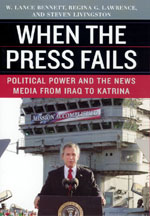Will Palin ride press deference to the White House?
 Regina G. Lawrence is a coauthor of When the Press Fails and, with Melody Rose, of the forthcoming Playing the Gender Card? Media, Strategy, and Hillary Clinton’s Run for the White House (Lynne Reinner Publishers). As such, she has deeper insight than most into the renewed prominence of gender issues in press coverage of the ongoing presidential campaign:
Regina G. Lawrence is a coauthor of When the Press Fails and, with Melody Rose, of the forthcoming Playing the Gender Card? Media, Strategy, and Hillary Clinton’s Run for the White House (Lynne Reinner Publishers). As such, she has deeper insight than most into the renewed prominence of gender issues in press coverage of the ongoing presidential campaign:
Roughly two weeks after Alaska Governor Sarah Palin was named as Senator John McCain’s running mate, McCain’s campaign manager Rick Davis announced on Fox News that Palin would not interact with reporters “until the point in time when she’ll be treated with respect and deference.”
Apparently, the McCain campaign is hoping that the new addition to the Republican ticket will get the same kind of media treatment that George W. Bush received in the early years of his presidency—particularly concerning his war agenda. As we document in When the Press Fails, the national media mostly tip-toed around the inconsistencies and holes in the Bush administration’s claims about Iraq (among other issues), unintentionally abetting the administration’s rush to war.
Election campaigns are generally different. Presidential candidates (and, to a lesser degree, their running mates) usually can only dream of press coverage like the early Bush administration received. In covering campaigns, journalists seem to hew to a different set of norms, and challenging the candidates is more routine (though still uneven) than challenging sitting presidents. Research has shown, for example, that coverage of the leading presidential candidates is often negative, and becomes more so as the campaign wears on. Barack Obama was the rare candidate to initially dodge this pattern. His coverage in the critical early months of the primary season was remarkably positive—though that changed as he assumed the “frontrunner” role.
Sarah Palin seems to have experienced the whole gamut of possible press coverage almost all at once, enjoying rock star treatment similar to Barack Obama’s while also being intensely scrutinized in some hard-hitting stories that show her to be, shall we say, less than honest—and less than qualified. It’s as if the usual timeline of increasingly negative coverage has been crammed into less than three weeks—a function of the short time between her being named to the ticket and election day.
No doubt anticipating such scrutiny, the McCain campaign has tried some of the same news management techniques employed by President Bush (and, to be fair, by other presidents as well). The campaign has seized control of all communications between the press and the Alaska governor’s office and has cordoned Governor Palin off from unscripted interactions with the press, letting her off the leash only long enough for one squirm-inducing interview with ABC’s Charlie Gibson.
They’ve also tried a novel approach. While insisting that Governor Palin should be shown “deference” by the press, the campaign blasts those who question her qualifications as “sexist.” In a recently-released ad, a female voice denounces the Obama campaign for calling Palin a “liar,” hissing “how disrespectful.”
Research suggests that, historically speaking, female candidates have been less likely to actually play the gender card than to be accused of playing it—that is, accused of demanding to be judged by different standards than male candidates. In this general election, we see the precise opposite: The McCain-Palin campaign tries to silence critics with charges of sexism, and the Democratic opponent seems uncertain how to question Palin’s readiness and record.
This is a risky strategy, and one available only to a candidate like Sarah Palin. Last weekend’s Saturday Night Live skit, which featured the return to the show of comedienne Tina Fey as Governor Palin showed why. In a mock “public service announcement,” Fey/Palin called on the media to avoid sexism in their campaign coverage: “Please, stop Photoshopping my head on sexy bikini pictures.… Stop using words that diminish us like pretty, attractive, beautiful.” A “milf” like Sarah Palin—the quintessential backyard barbeque gal—can play the gender card game more readily and effectively than a candidate like Hilary Clinton, who has long been perceived as less than truly feminine. (If you don’t believe me, check out this Forbes op-ed, in which Harvard’s Harvey Mansfield praises Palin for showing “none of the features that betray the feminist in action.” “You may be sure,” Mansfield says, “that I am not the first one to notice that feminist women are unerotic.”)
Whether this strategy will work remains to be seen. Will Sarah Palin ride press “deference” to the White House?
When the Press Fails: Political Power and the News Media from Iraq to Katrina is by W. Lance Bennett, Regina G. Lawrence, and Steven Livingston. Read an excerpt from the book.